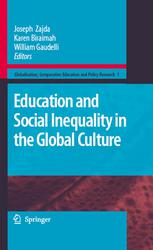

Most ebook files are in PDF format, so you can easily read them using various software such as Foxit Reader or directly on the Google Chrome browser.
Some ebook files are released by publishers in other formats such as .awz, .mobi, .epub, .fb2, etc. You may need to install specific software to read these formats on mobile/PC, such as Calibre.
Please read the tutorial at this link: https://ebookbell.com/faq
We offer FREE conversion to the popular formats you request; however, this may take some time. Therefore, right after payment, please email us, and we will try to provide the service as quickly as possible.
For some exceptional file formats or broken links (if any), please refrain from opening any disputes. Instead, email us first, and we will try to assist within a maximum of 6 hours.
EbookBell Team

0.0
0 reviewsThe book critically examines the overall interplay between globalisation, social inequality and education. It draws upon recent studies in the areas of globalisation, educational inequalities and the role of the State. It explores conceptual frameworks and methodological approaches applicable in the research covering the State, globalisation, social stratification and education. It demonstrates the neo-liberal ideological imperatives of education and policy reforms, and illustrates the way the relationship between the State and education policy affects current models and trends in education reforms and schooling globally. Various book chapters critique the dominant discourses and debates pertaining to the newly constructed and re-invented models of neo-liberal ideology in education, set against the current climate of growing social stratification and unequal access to quality education for all.
The book, constructed against this pervasive anti-dialogical backdrop, aims to widen, deepen, and in some cases open, discourse related to globalisation, and new dimensions of social inequality in the global culture. It is presented around three particular dimensions: hegemony, equity, and cultural capital, as these continue to be most significant dimensions defining social inequality in the global culture.
The book explores the ambivalent and problematic relationship between the State, globalisation and social change. Using a number of diverse paradigms, ranging from critical theory to globalisation, the authors, by focusing on globalisation, ideology and social inequality, attempt to examine critically both the reasons and outcomes of education reforms, policy change and transformation and provide a more informed critique on the Western-driven models of accountability, quality and school effectiveness. The book draws upon recent studies in the areas of equity, cultural capital and dominant ideologies in education. It examines the overall interplay between globalisation, ideology and social inequality in education.